
New car prices are often higher than many people can afford. Many buy a used car, although there’s always some concern over repairs making up the difference for any savings. A certified pre-owned car (CPO) is both affordable and assures the vehicle will provide lasting benefits. It is, of course, a pre-owned car, but with many advantages over a traditional used automobile.
How Is a CPO Car Different?
You can buy a certified pre-owned car from any dealer that sells new (and used) cars. It will probably look no different than any other model on the lot. Some of the main perks include:
- Low mileage: Pre-owned models usually have less than 80,000 miles. They’re typically no older than five to seven years, and tend to have a cleaner history and be better maintained.
- Manufacturer certification: The original manufacturer manages its own CPO program, so the vehicle must meet its standards before being resold. The car can also be serviced at any franchised dealership.
- Multipoint inspection: To be certified, the vehicle must pass a variety of tests. Inspections cover parts and components most prone to wear and tear, including the engine, transmission, shocks, tires, brakes, and other mechanical and electrical components. If the car doesn’t meet the standards, it can’t be sold as certified pre-owned unless it is repaired.
- Extended/limited warranty: CPO cars come with a manufacturer-backed warranty. An extended warranty for a CPO can include roadside assistance, loaner cars, oil changes, and reimbursements for rental cars. A limited warranty provides coverage for a specified number of miles or months.
- Financing deals: Low-interest financing deals are often provided directly from the manufacturer; banks and credit unions don’t usually charge higher rates than for new cars. You can also negotiate the price with the dealer.
But all these benefits come at a cost. The trade-off is you often pay more for a certified pre-owned car than a non-certified used car.
How Does a Used Car Become Certified?
Following a rigorous, multipoint inspection, a car becomes certified if it meets all the qualifications set by the manufacturer. It must be in good condition and be under a specified mileage. The dealer must follow the car maker’s standards for inspection and repair work. Both the interior and exterior are scrutinized as manufacturers have strict criteria for aesthetics. Damaged or worn parts are repaired/replaced before the car is sold—at no cost to the buyer. Although the general specifications vary from one manufacturer to another, the aim is to sell a vehicle that is high in quality.
How to Find the Right Certified Pre-Owned Car for You
As you’re shopping around, look at the CPO program of each carmaker. Each program varies based on coverage limits, lengths of warranties, and deductibles you would pay for repairs, not to mention a variety of other extras. Ask for a vehicle history report directly through the program, just to be sure it hasn’t sustained major damage in an accident or has had too many maintenance issues.
Also, when you see a vehicle labeled as “certified,” check with the dealership if it’s actually part of the manufacturer’s CPO program. If not, you won’t get a manufacturer-backed warranty and the dealer may have followed its own rules for certification. This means the inspection process many not be consistent with the manufacturer’s, which doesn’t promise the vehicle meets as strict of a set of qualifications.
Contact CarWorld
CarWorld has an extensive inventory of certified pre-owned cars and can help you find the right one for you at the best value. Open during the coronavirus pandemic, we’re following social distancing and other guidelines to protect our employees and customers. Flexible financing options are available. To learn more, visit our dealership in Hawthorne or call 833-219-9951 today.